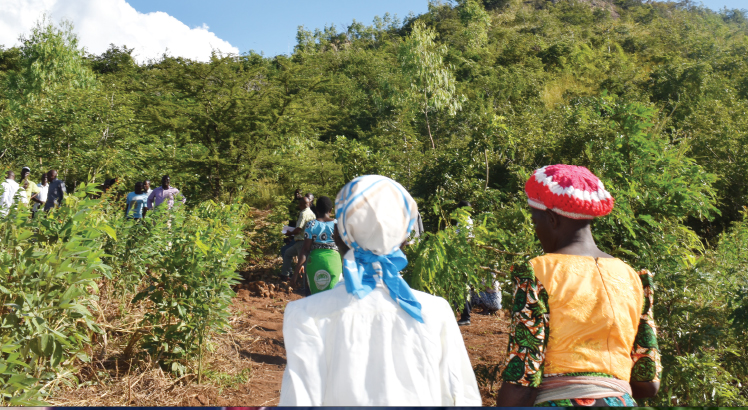Villages unite to make Pasani Hill green again
Communities around Pasani Hill in Mulanje have found meaning in planting trees under whose shade they do not expect to sit.
Pasani Catchment Cluster Committee has rallied Malawians in five surrounding villages to reforest the hill left bare by the growing appetite for firewood and charcoal.
The hill, situated in Traditional Authority (T/A) Mkanda, is surrounded by Mkawera, Muliya, Mkwera, Harrineck and Nkhunguza villages.

Back in 2018, its natural beauty faded with the wanton cutting of trees by the growing population in its vicinity. The massive loss of trees fuelled gully erosion in the fields at its foot.
“When the rains came, the fertile soil was being washed away. This fuelled hunger as crop yields in the degraded fields dwindled. Besides, women endured long walks hunting for fuelwood,” says Catchment committee chairperson Bornwell Ntumwinda.
This prompted collective efforts to tackle the challenge.
Ntumwinda and his community were glad when Kulima Better, a project funded by the European Union, intervened to support their catchment restoration efforts.
The communities established committees of 12 members in each of the five villages. The 67-strong catchment cluster committee brings together these village groups together with village headmen.
The cluster has since planted about 11 000 trees and 86 percent of them have survived to replace those gone to the ground. The green cover includes acacias that hold the soil against heavy run-off water and fix soil nutrients in the hill.
To improve soil fertility, the farmers were encouraged to plant Tephrosia Vogelii.
Village head Muliya works together with the cluster committee, encouraging people to take care of the trees.
The local leaders, with support from Mulanje District Council, have formed by-laws to sustainably manage and protect the budding forest.
The community laws prescribe a K5 000 fine for everyone found cutting down a trees.
“We once arrested a fellow committee member who was cutting down trees in the hill. He was ordered to pay the fine, but he failed. The village security forum, which works the cluster catchment committee, took his bicycle temporarily until he paid the fine,” narrates Muliya.
The community is determined to protect the hill for their good and that of future generations.
The committee has integrated bee-keeping to reap the benefits of protecting the hill.
They have installed 120 beehives that came into use this year.
In 2020, they made small check dams using 2 000 sacks filled with soil to reclaim the heavily gullied spots on the slopes of Pasani and nearby fields.
Rebecca Benjamin says the check dams have reduced soil erosion and maintained silt in her hillside maize garden.
“At first, I thought using soil-filled sack bags to reclaim soil was useless. I didn’t see the reason we had to do this, but now l have seen the benefits,” she says.
Today, her community is reaping the fruits of their hardwork as the hill is getting green again.
The community members are convinced that the emerging trees will benefit the community and generations to come.
The forests, which refresh the air we breathe and cool the planet , contribute to the global Sustainable Development Goals (SDGs) to combat climate action.
SDGs calls for efforts to strengthen resilience and adaptation to climate-related hazards and natural disasters.
Kulima Better is a five-year project implemented by a consortium of non-governmental organisations, with Self Help Africa as the lead agency.
Other partners include Plan International Malawi, ActionAid Malawi and Evangelical Association of Malawi.
Its goal is sustainable agricultural growth promoted to enhance income, food and nutrition security in the Kulima districts within the context of a changing climate.






One Comment